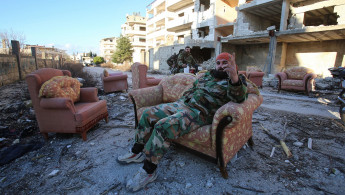Syrian opposition pulls plug on peace talks
US Secretary of State John Kerry Thursday insisted peace talks would go ahead in Geneva next week but they would not be face-to-face. The Syrian government, which is backed by Russia, has said it is ready to attend.
But George Sabra, deputy head of the opposition delegation, said obstacles which the opposition say are obstructing the talks had not been removed. "There must be a halt to the bombardment of civilians by Russian planes, and sieges of blockaded areas must be lifted," Sabra said by telephone.
"The form of the talks does not concern us, but the conditions must be appropriate for the negotiations," Sabra told Reuters. Asked if that meant the opposition would not attend the kind of indirect talks mentioned by Kerry, he said "yes".
 |
The talks have also been thrown into doubt by a disagreement over who should represent the opposition |  |
Riad Hijab, who chairs the opposition council, was due to discuss diplomatic efforts with US Secretary of State John Kerry Saturday and "all the matters will be tabled clearly", Sabra said.
The talks have also been thrown into doubt by a disagreement over who should represent the opposition. Russia wants the opposition delegation expanded to include groups such a Kurdish faction that controls wide areas of the the northeast.
Sabra's opposition council, the High Negotiations Committee (HNC), was formed in Saudi Arabia last month and groups political and armed opponents of President Bashar al-Assad, including major rebel factions fighting Damascus in western Syria.
Opposition representation
Countries backing the talks, including the United States, Russia, Saudi Arabia, Iran and Turkey, are still at odds over which fighting groups should be branded “terrorists,” a discussion that is expected to continue even as de Mistura shuttles between rival delegations in Geneva.
Russia and Iran, which support President Bashar al-Assad, have rejected attempts by Saudi Arabia, which like the United States and European powers opposes him, to organise the opposition’s delegation for the talks.
Russia wants the opposition negotiating team expanded to include other figures that could be deemed closer to its own thinking as well as the main Syrian Kurdish party, the PYD, and the affiliated YPG militia. But the opposition has said it will boycott the Geneva negotiations if Russia insists on such a shake-up.
Among Russia’s objections is the inclusion of Mohammad Alloush as chief negotiator for the opposition.
He is a member of the political bureau of Jaysh al-Islam, a major rebel faction which Russia considers a terrorist group, and – diplomats say – is a close relative of Zahran Alloush, killed in a Russian airstrike.
 |
The Syrian opposition has rejected a role for the Kurdish factions, saying they should join the government side if they are to attend negotiations. |  |
Damascus has not responded officially, but state-affiliated daily Al-Watan said "observers" deemed Alloush's appointment "a provocative step with the sole goal of thwarting any possible dialogue".
A Syrian Kurdish leader said Syrian Kurds must be represented at peace talks or they will fail and accused Jaysh al-Islam of fostering the "same mentality" as al Qaeda and IS.
"If there are some parties that are effective in this Syria issue who are not at the table, it will be the same as what happened in Geneva 2," Saleh Muslim, co-chair of the Kurdish Democratic Union Party (PYD) told Reuters, referring to failed negotiations in 2014.
"Their mentality is the same as the Nusra Front and Daesh (IS)," he said of Jaysh al-Islam. "They clearly want to establish an Islamic state."
The HNC has rejected a role for any third parties in the talks, and says the Kurds should join the government side if they are to attend negotiations. The opposition accuses the Kurds of cooperating with Damascus, a charge they deny.
Syria's largest opposition coalition had on Wednesday named the Islamist rebel chief backed by Riyadh as its chief negotiator for the peace talks.
Syrian regime team
Meanwhile, Syria's UN envoy will be the regime's chief negotiator in upcoming peace talks, a government source said on Thursday
Syria's ambassador to the United Nations, Bashar al-Jaafari, will be the government's chief negotiator, with Deputy Foreign Minister Faisal al-Moqdad heading the delegation, the Syrian government source said.
Jaafari also served as the regime's chief negotiator in a previous round of peace talks in Geneva in 2014.
Al-Watan said the delegation would also include several senior lawyers and other foreign ministry officials.





 Follow the Middle East's top stories in English at The New Arab on Google News
Follow the Middle East's top stories in English at The New Arab on Google News


